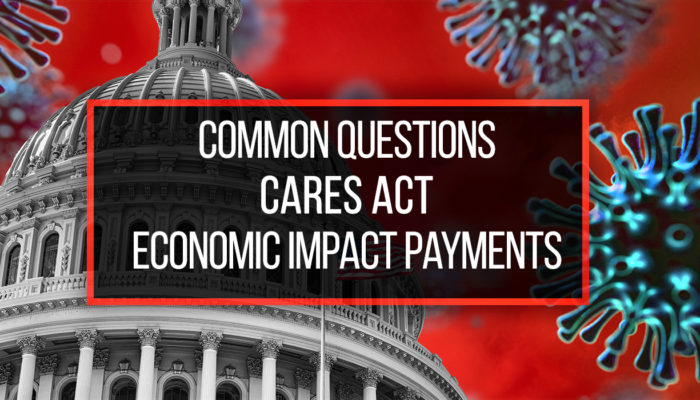One of the most talked-about provisions in the Coronavirus Aid, Relief, and Economic Security Act (CARES Act) have to do with the economic relief checks for many individuals and families. But despite the CARES Act becoming law in March 2020, not all eligible payment recipients have received their money.
If you’re wondering when you can receive your money, why you haven’t received your payment or if there are any tax consequences for this payment, read on.
When You Should Receive Your CARES Act Economic Impact Payments
For a more detailed look at these economic payments to individuals and families, you can check out the earlier blog post, “Coronavirus Tax Scams.” But the main point is that individuals will receive $1,200 as long as they make less than $75,000.
Those making between $75,000 and $99,000 will still receive some money, but a reduced amount. Those making more than $99,000 will get nothing. The IRS estimates that more than 150 million total cash payments will end up going out as required by the CARES Act.
Those who had their direct deposit information on file with the IRS when they filed their 2019 taxes should have already received their payments through direct deposit. And most of those who uploaded their direct deposit information on the IRS website within the last few months specifically to receive their Economic Impact Payment should also have their money by now.
For those waiting on paper checks, it will take more time to receive the money. Paper checks will be mailed out based on the adjusted gross income of the taxpayer. Those with lower adjusted gross incomes will get their checks sooner.
Taxpayers that have an adjusted gross income of $10,000 or less should have their paper checks by now as those checks started going out around April 24, 2020. From there, the IRS plans on mailing out roughly five million checks each week.
Taxpayers with an adjusted gross income between $20,000 and $30,000 should also have received their checks by now as they went out around May 1, 2020. And those with adjusted gross incomes between $30,000 and $40,000 had their checks sent out around May 8, 2020. This means Economic Impact Payments will be going out all summer and possibly into early September.
If you’d like to check the status of your payment, you can visit the Economic Impact Payments section of the IRS website.
Some Common Questions Concerning the Economic Impact Payments
Two of the most common tax-related questions individuals have concerning these payments have to do with how it will affect their taxes in 2020 and their eligibility for federal benefits.
According to the Economic Impact Payment Information Center on the IRS website, these payments aren’t gross income with respect to federal income taxes. In other words, when you file your 2020 taxes in early 2021, you will not need to include the Economic Impact Payment on your federal income tax return as taxable income. However, things could potentially be different for your state or local tax return. You’ll need to consult with a tax professional to know for sure.
As for federal aid eligibility, the Economic Impact Payment will have no influence. This means that any Medicare, Medicaid or Affordable Care Act health insurance subsidies, payments or benefits will not be jeopardized by accepting these cash payments. But state or local aid program eligibility could be potentially affected.
Do Not Ignore Your Tax Problems!
Tax Law is Our Specialty. Contact us to Get Your Life Back to Normal.

